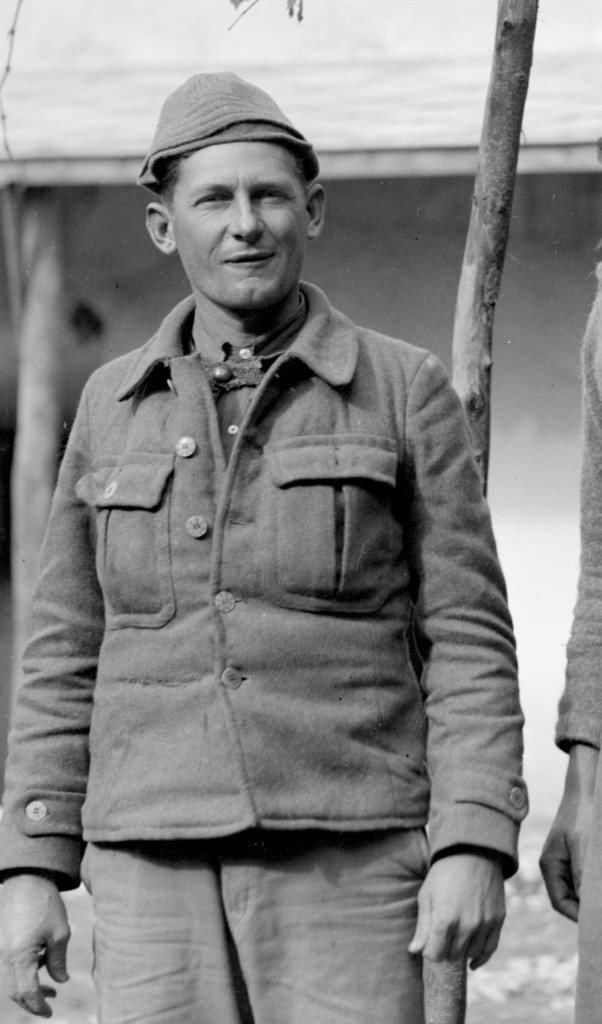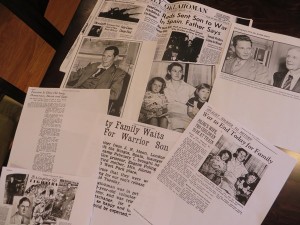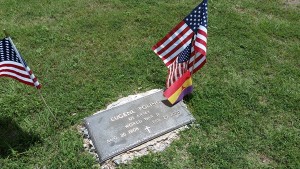From Oklahoma to Spain: Fighter for Justice
Eugene Poling (1908-2000), from Lone Wolf, Oklahoma, fought with the Republic in Spain, joined the U.S. Army in World War II, and for almost forty years launched repeated campaigns for a U.S. House seat. Journalist Andrew Griffin reconstructs his life. “When I went to Dougherty to talk to people who knew ‘Mr. Poling,’ they said he was nice but a bit odd, chewing on plants, and with baby-smooth skin on his face well into his 70s and 80s.”
It was Memorial Day. My two young sons and I were wandering around the Lawnview Cemetery in Cordell, Oklahoma looking for a grave marker for a man we never knew. All I knew was that an American volunteer in the Spanish Civil War named Eugene Poling was buried here, somewhere. At the very edge of the cemetery, facing a farmer’s field, I found Poling’s final resting place.
Kneeling down, I said a few words, thanking him for his service both in Spain and World War II, fighting fascism. I placed a small International Brigades flag next to an American flag positioned near his small gravestone which read: “Eugene Poling US Army World War II Aug 28 1908 Feb 29 2000.”
The almost ever-present Oklahoma wind caused the flags to flap. I felt closer to this inspiring man. But who was he? What led him to leave Oklahoma and fight on Spanish soil so far from home?
I heard about Eugene Poling thanks to Steve Dinnen. He is an Iowa-based Spanish Civil War enthusiast who recently wrote for The Volunteer about his experience digging at the Belchite battlefield archaeological site. After reading about Dinnen’s experience, I interviewed him in Des Moines about his time in Spain, writing about it for my website RedDirtReport.com.
Dinnen later emailed me information about two Oklahomans he was aware of who fought in Spain. One, James “Doc” Hill, was from the town of Marlow. A sergeant, Hill would serve with the XV International Brigade, MacKenzie-Papineau Battalion and be killed in action during the Ebro Offensive at Corbera in September 1938.
Hill’s buddy, and fellow Oklahoman in the Mac-Paps, was Eugene Victor Poling, a native of Lone Wolf, Oklahoma in Kiowa County. This was an area that was hard hit by the Great Depression and Dust Bowl conditions.
Poling took on the name “Eugene Debs Poling” and in early 1937 answered the Communist Party call for volunteers to go to Spain. The Party, with an office in Oklahoma City, appealed to young Poling who was jobless and saw capitalism as the cause of America’s ills. The chance to go to Spain—even leaving behind a wife and two young daughters—proved to be too strong for the independent-minded Poling to ignore.
Poling’s family did not fully understand his reasons for leaving his life behind to go to join the Spanish Republican army.
In March 1938, reporter T.T. Johnson with The Daily Oklahoman, the state’s major daily, did a profile on Poling, Poling’s brother Gordon (then serving in the U.S. Army’s cavalry) and his father Alonzo Poling, headlined “Bringing Up Fighters.” Johnson wrote about how the Poling men seem “born to fight,” as the senior Poling fought as a volunteer in the Spanish-American War (but a man who was at odds with his son’s communistic beliefs).
While Oklahoma had been a hotbed of socialism in Eugene Poling’s youth, it was not until he attended the Marxist-leaning Commonwealth College in rural Mena, Arkansas that the Lone Wolf native really embraced socialism, and ultimately communism.
In the article, Johnson references the idealistic letters Poling wrote back to family—family that did not fully understand Poling’s reasons for leaving his life behind to go to join the “Spanish Republican army,”—as he explains, noting that Spain is “a wonderful country” and “I have not regretted a day I have spent here.”
“Yes, here I am in the land of milk and honey, dodging fascist murderers. But they won’t get me.”
Added Poling, somewhat defiantly: “Yes, here I am in the land of milk and honey, dodging fascist murderers. But they won’t get me.”
But Poling was injured—“wounded in the thigh by shrapnel” at Fuentes del Ebro—and would be captured by Franco’s Fascist troops, finding himself in a Nationalist prison camp at Burgos, Spain where he would ultimately be released in February 1939, returning to Oklahoma, having been cited for bravery by the International Brigades.
The Daily Oklahoman, a decidedly conservative paper, took interest in Poling’s war stories, wrote that his wife, Mayona Miller Poling, was excited her husband was returning home. “I hope he will settle down now,” she told the newspaper. But Eugene Poling would not settle down. In fact, he would divorce his wife and then serve—stateside—in the U.S. Army at Fort Hood, Texas, during World War II.
A farmer and agronomist who believed in the natural healing powers of plants, Poling would remain close to the land the rest of his life, settling for several decades in Dougherty, Oklahoma, where he would launch repeated—unsuccessful campaigns—for a U.S. House seat from the 1950’s to 1990 as a Democrat.
When I went to Dougherty to talk to people who knew “Mr. Poling,” they said he was nice but a bit odd, chewing on plants and talking of their healing powers, all while keeping baby-smooth skin on his face well into his 70s and 80s. And then the truth about his communist past ultimately came out.
The mayor of Dougherty, Judy Hale, showed me a picture of another grave site for Poling—this one Memorial Cemetery in Oklahoma City, surprisingly enough. A family member is believed to have put it there as it says “Eugene V. Poling Son of Alonzo Aug 28 1908—Abraham Lincoln Bde. Spain 1937-1939 7 Mo. US Inf. 1945”
At the very bottom is a statement: “Fighter for justice for all.”
Andrew Griffin is a writer and researcher based in Oklahoma City with an interest in the Oklahomans of the Abraham Lincoln Brigade. He runs the news website Red Dirt Report and is starting a Masters program in American History in September.
















Andrew:
Glad you got this published. Enjoyed reading it.
Wayne Wiegand
Eugene Poling was my great-grandfather. I never knew anything about him except that he was Polish and that my great-grandparents had divorced young.
Thank you for writing the article.
I can’t help but wonder what kind of plants he was chewing 🙂
Son of Alonzo Poling and Hattie Deweese. My great uncle.
Eugene Poling was my uncle. My grandmother Hattie Dewees Knight Poling married Alonzo after each had lost their first spouses. My mother, Florence Knight Wallace, was from the Finis Knight who died. Eugene was from the second marriage with Alonzo Poling.
Uncle Gene. I didn’t know about his service in the Abraham Lincoln Brigade. Eugene Poling was my Uncle. My Mother, Lucile’s 2-yr-older brother. I knew he had been wounded in war. I didn’t know where. I knew he was a member of the communist party, because his and his sister Thelma’s beliefs had an effect on my career in the US Army.
I remember when Uncle Gene came home after WWII. I was 3 or 4 at the time, and he looked good in uniform. I didn’t know he didn’t go overseas in WWII.
I remember that he once won a tennis tournament when he was in his 80’s. He was always a health-conscious person, and I can remember him when I was a youngster, that every time I was around him, he was a kind and gentle man and had an amazingly kind heart.
Thank you, Mr Griffin, for writing this article.
Eugene was my uncle a brother to Carlton. Yes, he was little weird but always in a good mood. I knew he garden in natural foods and he made several trips to Florida to some Natural Food Conventions.
I don’t think some men are ever supposed to marry for they are mercenaries or are so dedicated to a cause or their profession that they hardly have time for family.
When my husband was going to work at the pentagon and need a special clearance, he hoped when they checked back on both my family and his that Eugene didn’t show up as a communist and it might cause him a problem.
I have been into the Poling genealogy for weeks now and this came at a great time for me to add to my search.
Thanks